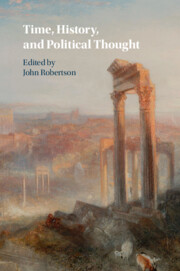Book contents
- Time, History, and Political Thought
- Time, History, and Political Thought
- Copyright page
- Contents
- Contributors
- Acknowledgements
- Note on References and the Bibliography
- Introduction: Time, History, and Political Thought
- 1 Out of Time? Eternity, Christology, and Justinianic Law
- 2 Historicity and Universality in Roman Law before 1600
- 3 ‘The Logic of Authority, and the Logic of Evidence’
- 4 Christian Time and the Commonwealth in Early Modern Political Thought
- 5 Politic History
- 6 Hobbes on the Theology and Politics of Time
- 7 The Recourse to Sacred History before the Enlightenment: Spinoza’s Theological–Political Treatise
- 8 Law, Chronology, and Scottish Conjectural History
- 9 Civilization and Perfectibility: Conflicting Views of the History of Humankind?
- 10 Kant on History, or Theodicy for Mortal Gods
- 11 Law’s Histories in Post-Napoleonic Germany
- 12 After Historicism: The Politics of Time and History in Twentieth-Century Germany
- 13 The Right to Rebel: History and Universality in the Political Thought of the Algerian Revolution
- Bibliography
- Index
2 - Historicity and Universality in Roman Law before 1600
Published online by Cambridge University Press: 08 June 2023
- Time, History, and Political Thought
- Time, History, and Political Thought
- Copyright page
- Contents
- Contributors
- Acknowledgements
- Note on References and the Bibliography
- Introduction: Time, History, and Political Thought
- 1 Out of Time? Eternity, Christology, and Justinianic Law
- 2 Historicity and Universality in Roman Law before 1600
- 3 ‘The Logic of Authority, and the Logic of Evidence’
- 4 Christian Time and the Commonwealth in Early Modern Political Thought
- 5 Politic History
- 6 Hobbes on the Theology and Politics of Time
- 7 The Recourse to Sacred History before the Enlightenment: Spinoza’s Theological–Political Treatise
- 8 Law, Chronology, and Scottish Conjectural History
- 9 Civilization and Perfectibility: Conflicting Views of the History of Humankind?
- 10 Kant on History, or Theodicy for Mortal Gods
- 11 Law’s Histories in Post-Napoleonic Germany
- 12 After Historicism: The Politics of Time and History in Twentieth-Century Germany
- 13 The Right to Rebel: History and Universality in the Political Thought of the Algerian Revolution
- Bibliography
- Index
Summary
Magnus Ryan reverses the standard story of the development of Roman Law: that a law declared universal and eternal by the Emperor Justinian, and accepted as such by the medieval lawyers, was finally ‘historicized’ in the sixteenth century by the French historical school of Humanist jurists. On the contrary, Ryan argues, the understanding of Roman Law held by medieval jurists down to Bartolus was strictly historical, premised on the assumption that the kingdoms and cities of medieval Europe were continuous with the Roman Empire, their authority derived from the same ‘lex regia’ by which the emperors had been granted their authority by the Roman people. The first breach in this assumption of historical continuity appears to be made in the fifteenth century, when similar transfers of authority were identified as taking place independently; and in the sixteenth century Protestant resistance theorists began to claim that original popular authority was a universal principle, exemplified severally in the original, ‘ancient’ constitutions of individual kingdoms (such as France). It was by abandoning the premise of historical continuity with Rome, in other words, that Roman Law was made ‘universal’.
Keywords
- Type
- Chapter
- Information
- Time, History, and Political Thought , pp. 54 - 66Publisher: Cambridge University PressPrint publication year: 2023

